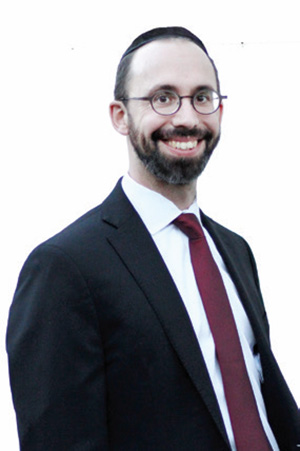
When I was learning in the Mir Yeshiva in Yerushalayim, I was part of a smaller group that learned with our rosh yeshiva, Harav Nosson Tzvi Finkel, zt”l. Tuesdays were special in the Mir, for Rav Finkel would give a shiur to the entire student body—well over a thousand students. Earlier in the day, while learning with our group, the rosh yeshiva was troubled with many questions on the Gemara. No one could offer a solution. The clock struck 12 and we finished our seder. At 12:30 the rosh yeshiva would address the entire student body on this very subject that perplexed us all.
I remember leaving Rav Finkel looking tired and worn out. He suffered terribly from Parkinson’s disease. Yet, at 12:30, he got up before everyone and gave a tremendous shiur that resolved all the questions we had earlier. We were awed and incredulous. Soon after, I went over to the rosh yeshiva and asked him, “Rebbi, how were you able to answer all the issues in just a matter of minutes?” He replied in a matter-of-fact way, “When one accepts upon himself a commitment for Hashem, then Hashem gives him special help to complete that commitment!”
Indeed, that’s how Rabbi Finkel lived his life. He undertook the responsibility of the Mir Yeshiva and all its financial burdens, along with the care and concern for each and every student. Because he faithfully stepped up to the plate, Hashem gave him tremendous help to build the yeshiva from 1,000 to 6,000 students and to expand the yeshiva from one building to close to 10, along with an additional yeshiva for high-school-age students.
Such is the power of commitment.
In Parshas Naso, the Torah discusses the Nazir—the individual who makes a commitment to abstain from wine—not to cut his hair and not to come into contact with a deceased. The Sforno notes that the Torah uses an interesting word to describe the Nazir’s commitment: Ish ki yafli lindor neder (Naso 6:2)—a person who make a commitment to accept a self-pledge, as though it were required by Jewish law. The Torah’s word yafli comes from the word pela—a wonder. What is so wondrous about the commitment of this Nazir? The Sforno explains that someone undertaking a commitment to go against one’s natural inclinations is a wonder. As the rest of the world rushes to fulfill their desires, this individual restrains his indulgence.
The Lev Simcha points out that the commitment of this Nazir is not huge. It only lasts for 30 days. Yet, the Torah calls this individual a Nazir, which comes from the word nezer—crown—as the pasuk explicitly says—because the crown of Hashem is upon him (Naso 6:7). Incredible! Someone undertakes a commitment to bring himself closer to Hashem for just 30 days and he already is crowned by Hashem!
Shavuos is all about commitment. In fact, we refer to Shavuos as “Kabbalas HaTorah”—loosely translated as “accepting the Torah.” However, the word kabbalah is more precisely used in reference to an undertaking—a commitment. For example, a kablan is a builder who is responsible for an entire construction project. This gives us a new understanding of why we refer to reciting Krias Shema as being kabbalas ol malchus Shomayim—committing to accept the yoke of Heaven.
It’s all about commitment—our commitment to adhering to and embracing Hashem and His Torah.
It’s not an easy proposition. However, Hashem gives special help to those who commit to Him, in proportion to their commitment, and they become enhanced with the crown of Hashem.
We all have struggles in different areas, but even a small commitment for even a small period of time is colossal. I have a good friend who leaves his cell phone in a drawer for an hour each evening when he is spending time with his children. A commitment can be as simple as greeting our spouses with a smile when we come home at night—even for a week. Hashem takes our commitment and makes it grow.
Let us make our commitment to Torah, and then Hashem will give us the ability and strength to carry out the commitment beyond our dreams.
Rabbi Baruch Bodenheim is the associate rosh yeshiva of Passaic Torah Institute (PTI)/Yeshiva Ner Boruch. PTI has attracted people from all over northern New Jersey, including Teaneck, Paramus, Rockaway and Fair Lawn. He initiated and continues to lead a full multi-level Gemara-learning program in the evenings, gives Halacha and hashkafa shiurim on Shabbos and, more recently, has spread out beyond PTI to begin a weekly beis midrash program with in-depth chavrusa learning in Livingston, Springfield, Fort Lee and Jersey City, New Jersey. His email is rb@ptiweb.org.









